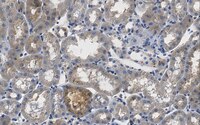MABN1837 Sigma-AldrichAnti-AGE Antibody, Carboxy-Methyl Lysine Antibody, clone 6C7
Anti-AGE, Carboxy-Methyl Lysine, clone 6C7, Cat. No. MABN1837, is a highly specific mouse monoclonal antibody, that targets Carboxy-Methyl Lysine (CML) modified proteins and has been tested in Immunohistochemistry (Paraffin).
More>> Anti-AGE, Carboxy-Methyl Lysine, clone 6C7, Cat. No. MABN1837, is a highly specific mouse monoclonal antibody, that targets Carboxy-Methyl Lysine (CML) modified proteins and has been tested in Immunohistochemistry (Paraffin). Less<<MSDS (material safety data sheet) or SDS, CoA and CoQ, dossiers, brochures and other available documents.
Recommended Products
概述
| Replacement Information |
|---|
重要规格表
| Species Reactivity | Key Applications | Host | Format | Antibody Type |
|---|---|---|---|---|
| M | IH(P) | M | Purified | Monoclonal Antibody |
| References |
|---|
| Product Information | |
|---|---|
| Format | Purified |
| HS Code | 3002 15 90 |
| Presentation | Purified mouse monoclonal antibody IgG2a in buffer containing 0.1 M Tris-Glycine (pH 7.4), 150 mM NaCl with 0.05% sodium azide. |
| Quality Level | MQ100 |
| Physicochemical Information |
|---|
| Dimensions |
|---|
| Materials Information |
|---|
| Toxicological Information |
|---|
| Safety Information according to GHS |
|---|
| Safety Information |
|---|
| Storage and Shipping Information | |
|---|---|
| Storage Conditions | Stable for 1 year at 2-8°C from date of receipt. |
| Packaging Information | |
|---|---|
| Material Size | 100 μg |
| Transport Information |
|---|
| Supplemental Information |
|---|
| Specifications |
|---|
| Global Trade Item Number | |
|---|---|
| 产品目录编号 | GTIN |
| MABN1837 | 04054839179020 |
Documentation
Anti-AGE Antibody, Carboxy-Methyl Lysine Antibody, clone 6C7 MSDS
| 职位 |
|---|







